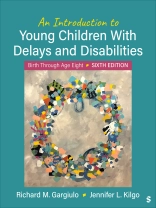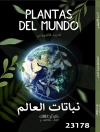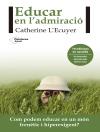An Introduction to Young Children With Delays and Disabilities: Birth Through Age Eight introduces readers to educational policies, services, and practices for future educators serving young children birth through age eight with delays and disabilities in early intervention/early childhood special education (EI/ECSE). Thoughtfully and comprehensively addressing the needs of young children and their families, authors Richard M. Gargiulo and Jennifer L. Kilgo offer interventions and instructional techniques that provide students with a broad understanding of important theoretical and philosophical foundations, including evidence-based decision making, cultural and linguistic responsiveness, and appropriate instruction and interventions in classroom settings and beyond.
The
Sixth Edition has been thoroughly updated to incorporate the Initial Practice-Based Professional Preparation Standards for Early Interventionists/Early Childhood Special Educators developed by the Division for Early Childhood (DEC) and Council for Exceptional Children (CEC) in 2020, as well as the DEC Recommended Practices.
Tabela de Conteúdo
PART 1: Perspectives, Policies, and Practices of Early: Childhood Special Education
1 Foundations of Early Childhood Special Education
2 The Context of Early Childhood Special Education
3 Family-Centered Services in Early Childhood Special Education
4 Delivering Services to Young Children With Delays and Disabilities
PART 2: Assessment and Planning for Young Children With Delays and Disabilities
5 Assessment of Young Children With Delays and Disabilities
6 Curriculum for Young Children With Delays and Disabilities
PART 3: Organization and Intervention for Young Children With Delays and Disabilities
7 Designing Learning Environments for Young Children With Delays and Disabilities
8 Adapting Learning Environments for Young Children With Delays and Disabilities
9 Intervention and Instructional Strategies for Supporting Young Children With Delays and Disabilities
PART 4 Contemporary Issues and Challenges in Early Childhood Special Education
10 Emerging Issues and Contemporary Challenges in Early Childhood Special Education
Sobre o autor
Personal experience and unforeseen opportunities led me to a career in early intervention and early childhood special education (EI/ECSE). When I was a young child, my sibling was born with multiple medical complications and died shortly after birth. This tragic event sparked my interest in early childhood disabilities and set me on a path toward a career in EI/ECSE. While I was studying psychology as an undergraduate, Congress passed Public Law 94-142, the Education for All Handicapped Children Act, which provided services for children with developmental delays and disabilities. This legislation opened new opportunities for me and solidified my passion for improving opportunities for infants and young children with delays and disabilities, as well as their families. I have pursued this passion in higher education. Currently, I am a professor of early intervention/early childhood special education at the University of Alabama at Birmingham (UAB). I hold a BS in psychology from Auburn University; teacher certification in general early childhood education; an MA in special education and certification in administration from UAB; and a doctoral degree in EI/ECSE from the University of Alabama (Tuscaloosa). Prior to my appointment to the faculty at UAB, I taught at Virginia Commonwealth University and the University of Hawaii. As a professor at UAB, I enjoy interprofessional teaching of graduate students representing a variety of disciplines (e.g., ECSE, physical therapy, occupational therapy) who are learning to collaboratively provide team-based services to young children with delays and disabilities and their families. My involvement in EI/ECSE has extended for many years. Before becoming a higher education faculty member, I provided direct services to young children with delays and disabilities and their families in various community agencies and school settings. Also, I worked as a teacher at an EI/ECSE program at the University of Alabama, the RISE Center. My experience with young children and their families has informed my ability to teach others, as well as my interest in various scholarly activities. My involvement at the state and national/international levels in service, scholarship, and personnel preparation activities has been a highlight of my career. For example, my leadership positions have included serving as the president of the Division for Early Childhood (DEC) of the Council for Exceptional Children (CEC). Additionally, I have been a member of the editorial review board for leading national journals, served as the principal investigator of numerous federally funded grants, and delivered presentations at conferences throughout the country. My research has focused on teamwork and interprofessional education. Through a series of federally funded grants spanning more than 25 years at UAB, my work has focused on teaming and collaboration as professionals representing multiple disciplines learn to work as members of transdisciplinary teams in early intervention and early childhood special education throughout the community. Collaboration with community partners is central to the success of my career. The recognition and accolades I have been fortunate to receive have primarily highlighted my dedication to teaching and my collaborative endeavors. In 2013, I received th












